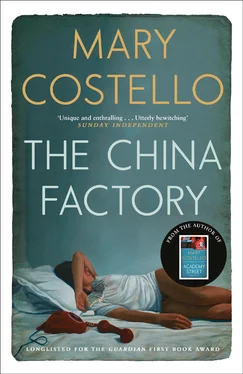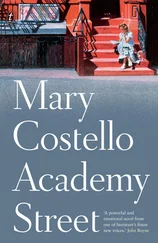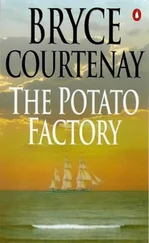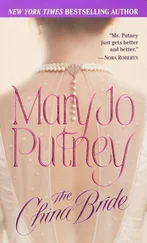Mary Costello - The China Factory
Здесь есть возможность читать онлайн «Mary Costello - The China Factory» весь текст электронной книги совершенно бесплатно (целиком полную версию без сокращений). В некоторых случаях можно слушать аудио, скачать через торрент в формате fb2 и присутствует краткое содержание. Год выпуска: 2015, Издательство: Canongate Books, Жанр: Современная проза, на английском языке. Описание произведения, (предисловие) а так же отзывы посетителей доступны на портале библиотеки ЛибКат.
- Название:The China Factory
- Автор:
- Издательство:Canongate Books
- Жанр:
- Год:2015
- ISBN:нет данных
- Рейтинг книги:5 / 5. Голосов: 1
-
Избранное:Добавить в избранное
- Отзывы:
-
Ваша оценка:
- 100
- 1
- 2
- 3
- 4
- 5
The China Factory: краткое содержание, описание и аннотация
Предлагаем к чтению аннотацию, описание, краткое содержание или предисловие (зависит от того, что написал сам автор книги «The China Factory»). Если вы не нашли необходимую информацию о книге — напишите в комментариях, мы постараемся отыскать её.
In these twelve haunting stories award-winning writer Mary Costello examines the passions and perils of everyday life with startling insight, casting a light into the darkest corners of the human heart.
The China Factory — читать онлайн бесплатно полную книгу (весь текст) целиком
Ниже представлен текст книги, разбитый по страницам. Система сохранения места последней прочитанной страницы, позволяет с удобством читать онлайн бесплатно книгу «The China Factory», без необходимости каждый раз заново искать на чём Вы остановились. Поставьте закладку, и сможете в любой момент перейти на страницу, на которой закончили чтение.
Интервал:
Закладка:
‘I’m not from around here,’ I said. ‘I’m from Dublin. But my mother was from Kilcash. I’m staying over there with my aunt.’
I watched her take this in. I had noticed how country people — even the staff in the boys’ boarding school where I had come to teach — treated me with a little reserve, reverence even, when I said I was from Dublin.
‘And who called you Claude, if your mother was from Kilcash?’ she asked.
‘My father’s name was Claude. He’s dead now. He was a Protestant. He had to convert to marry my mother.’
She was quiet then. Perhaps she was thinking what I had thought as a child — that my father must have loved my mother greatly to have crossed over.
‘It’s not as drastic as it sounds,’ I said. ‘He wasn’t religious. Protestants aren’t glued to their religion like us Catholics.’
I saw relief in her eyes. So it wasn’t the idea of my father’s sacrifice for love that had silenced her before, but worry that I too might be a Protestant. ‘And you, Suzanne? Why aren’t you a Mary or a Margaret or an Ann?’
She smiled. ‘My mother had an aunt, a nun. She spent a few years in a convent in France — near Limoges, where the famous china comes from. There was a young novice there called Suzanne. She’d arrived at the convent gates one evening after walking for miles, and the nuns took her in. She was an orphan. She saw terrible things in her young life — I don’t know what, maybe the war. Anyway my mother said if she ever had a daughter she’d call her Suzanne. And she did. But then Suzanne died when she was a year old, and a few years later she had me. I suppose she didn’t want to waste the name.’
Our names, in this place, had bound us. We were a little apart, she hauling the dead sister around, me with the Protestant blood in my veins. We spent evenings together. She told me her mother could be severe on people, even on her. One day we took the train to Dublin. She was very shy at the start. We went out to Howth and walked along the pier and then up the hill. I told her about Yeats and Maud Gonne and the day in 1892 when they cycled out there from the city.
‘They went out to visit Maud’s aunt, or some relative,’ I said. ‘They walked along the sea cliffs. Afterwards Yeats wrote a poem, “The White Birds”, about that day.’ I did not say that the poem held the wish that the two lovers be together forever, like the seagulls. I was not sure what I felt. I had nothing to pit the day against, no past loves. We walked around the city. In a pub, in a moment of joy and brief forgetfulness, she put a hand out to touch my arm and then, remembering herself, she shrank back swiftly, painfully, as if stung. It was this nervousness and her nearness that moved me. Nothing more. That day a huge Irish wolfhound had come towards us on the pier and in panic she’d crossed to my other side. I should have taken her hand. I saw how easily she was shaken — startled by the train’s sudden jolting or by car horns or cries on the streets. On the way home the train slowed and stopped in the middle of nowhere and in the eerie quiet of the carriage she looked out at a dark forest. I felt a wave of tenderness for her, for the part of her that so feared the world.
What came to mind in that moment were afternoons at university with my head full of Homer, sitting next to a fellow student in Greek Studies, and being briefly, easily, understood.
I wanted to want her that day in Howth, and other days. I wanted to charge our moments with romance. But as soon as she showed any sign of closeness or keenness or intimacy — even the mention of a next meeting — I withdrew in sullen silence.
One February night she came to my aunt’s door. ‘I’m going away,’ she said. Her voice was strained. ‘I have a job offer in London.’ My heart gave a little flutter. I felt such relief. ‘Unless you want me to stay,’ she added.
That evening last summer after meeting her on the road I came home and opened a bottle of wine and let The Köln Concert fill the house at high volume. When Jarrett began the climb in the first movement, I felt each pensive note brush my thoughts, I felt him pluck silence from inside me and put notes on it, put an act of faith in it. It was the same quiet collapse I’d felt on first hearing it thirty years ago. The notes rose and swelled and then fell away in that beautiful mesmeric descent. All my life music and books have been the refuge of my mind, the means of striving towards something pure and absolute and sublime. But how can I know what poets and musicians know? They suffer. They feel deeply. They weep for parched sparrows. And for some every angel is indeed terrible. Once I read a story about a woman whose job it was to care for an old bedridden man. The old guy still craved physical intimacy, and one day, moved with compassion, she locked the door and took off her top and let him fondle her breasts. There are some people for whom one will give almost anything and tolerate almost anything because of what they have suffered, because of the high order of their souls.
Over the years, over long winters and occasional melancholic nights I would often think ‘How bad could it have been, marriage?’ Other men manage. It would have brought its comforts — a family in whom to hope, a wife to direct a man outwards. Then I would find myself behind a woman in a queue and my eyes would fasten on her heavy arms or on flesh bulging over a band of her clothing and I’d feel a small jab at the base of my spine. Or I’d see a local couple drive by on a Sunday afternoon, the back seat full of kids, a wife in the front, and in the man’s face a glimpse of the cloying nature of domesticity. I’d turn in my gate, open my door, enter my quiet sheltered life with astonishing relief. She sent me a card that first Christmas, her address on the left-hand side, and a PS underneath. If we’re good, we’ll keep . They did not sound like her words, but I knew what it took for her to write them.
A year after she left, in springtime, my aunt suffered a stroke and was dead by the following autumn. She left me her house and it was the local builder whom I’d hired to do renovations over a year later who told me of Suzanne’s return. He was building a house for Tom Cleary, he said. ‘I believe the sister is back from England.’ He must have seen something in my face or known of my connection. ‘Did you not hear? Oh she’s back a while now but no one has laid eyes on her — she doesn’t go out or go to Mass or anything, and if you ever called up there there’d be all this shuffling and whispering and running around inside before they’d answer the door. The mother doesn’t let on that the daughter is back. In fairness, the brother is a nice fellow… She was a nurse in London, I believe.’
That winter I saw something that knocked me sideways. One morning in the dark I was awoken by a strange prompting. Something drew me outside. The world was encased in frost. I walked along the road and up the hill and into a field. My breath came in little bursts of vapour. I walked deep into the fields and there, ahead of me, rose a colossal ghostly silhouette. Horses… seven, eight of them, standing still and silent. Even when I drew close they did not stir. They looked at me and I at them, in perfect accord. Then the sky lightened and a ray of sun broke through and blazed on the horizon and steam rose from the horses’ backs and their coats shone. Still they looked at me, with dark patient eyes. I have never felt such wholeness, such oneness.
No, that is not correct. There was an afternoon long ago at university, with the sun slanting in through high windows and beside me, in the seat next to me, a pale youth from the west of Ireland, with fair to reddish hair and delicate cheekbones and tired misty eyes. Whenever he spoke he cast his eyes down, and his eyelids flickered. I would see him in the refectory among loud youths from the country, and I had an impulse to say, They are not your kind . His hand lay on the desk inches from mine that day. Something tender and unsayable lay there too. Perhaps it was the intensity of the Greek discourse, the tragic heroes and their reliance on the gods, and a wish on my part to inhale everything pure and radiant and divine then, but his presence and the still dreamy air of that afternoon filled me with a great upflow of joy, of benevolence for all of mankind.
Читать дальшеИнтервал:
Закладка:
Похожие книги на «The China Factory»
Представляем Вашему вниманию похожие книги на «The China Factory» списком для выбора. Мы отобрали схожую по названию и смыслу литературу в надежде предоставить читателям больше вариантов отыскать новые, интересные, ещё непрочитанные произведения.
Обсуждение, отзывы о книге «The China Factory» и просто собственные мнения читателей. Оставьте ваши комментарии, напишите, что Вы думаете о произведении, его смысле или главных героях. Укажите что конкретно понравилось, а что нет, и почему Вы так считаете.












